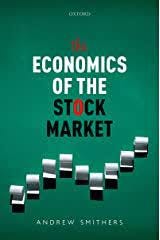Welcome to the Hale Report. My name is Lyric Hughes Hale, editor-in-chief of EconVue and your host today. EconVue, based in Chicago, is a home for independent voices and expert analysis of critical global economic issues. If you’d like to subscribe to our monthly newsletter as well as listen to our podcasts, please visit our website and if you can, support us on Substack.
You can also find past podcasts on our website EconVue.com and on Apple Podcasts, Spotify, and all the usual places.
My guest for our 30th episode is Andrew Smithers. We got together to talk about his new book which was just released in the US, The Economics of the Stock Market. This is a topic I believe interests just about everybody in the Hale Report audience.
Before you click play, let me tell you a bit about my rather legendary guest. Andrew Smithers studied economics at Cambridge, and ran the fund management business at S G Warburg which became Mercury Asset Management and is now BlackRock.
In 1989 he set up his own economics consultancy, Smithers & Co. Here I quote the Financial Times. “Much of the comments on economics and markets that he read as a fund manager struck him as nonsense and he has had great fun in pointing this out to clients over the years. He now has the opportunity to disseminate his views more widely and hopes that this will amuse and inform readers.”
In this podcast, Andrew Smithers explains that what you think you know about conventional economics and the stock market is wrong.
Some of the questions I asked and topics we covered as we discussed his new book by Oxford Press, with a preface by Andy Haldane:
After decades as a market practitioner, what moved you to write this more theoretical book?
Your thesis is that macroeconomic theory was formulated prior to the amalgamation of the extensive data that is now generated by financial markets: long-term data on returns from different classes of capital going back to 1801 now proves that conventional economics is broken. What adverse consequences does this have on economic policy?
Conventional economic analysis does not take financial markets into account because they are zeroed out by the Efficient Market Theory. How does this affect central bank decisionmaking. Should the Fed be listening to the markets?
Back in March, you wrote that economists believe central banks can stabilize economies by altering real interest rates, which the Fed did again earlier this month. Interest rates are thought to decide the cost of capital and levels of investment, which then change levels of economic activity. Why doesn’t this work in your view?
How should stocks be valued and are markets overvalued right now?
Investment in bonds vs equities is a mix dependent upon time horizons. What does this mean for asset allocations?
Life Cycle Savings Hypothesis-Franco Modigliani
Role of Companies / ESG
China, Japan, and State Capitalism
Are headed towards another financial crisis, and if so, why?
Download the full transcript here
I particularly enjoyed the discussion we had about other economists who greatly influenced Smithers’ thinking in applied economics. I confess that some of his references, to Brian Reddaway for example, let me down a rabbit hole of additional research. I have shared links to some of their works below.
By the way, Smithers’ book is full of charts and graphs, and a highly useful glossary with a foreword by Andy Haldane of the Bank of England, is available in the United States from June 22nd through Oxford Press and all of the usual places.
Thank you to Andrew Smithers for being my guest, and to the people behind the scenes who make EconVue possible, Managing Editor, Ying Zhan, and our producer, Sam Fu. Please visit our website to sign up for alerts about our next podcast.
Related Links
BOOKS
Valuing Wall Street : Protecting Wealth in Turbulent Markets
Andrew Smithers & Stephen Wright
A Non-Random Walk Down Wall Street
Andrew W. Lo & A. Craig MacKinlay
Lo and MacKinlay find that markets are not completely random after all, and that predictable components do exist in recent stock and bond returns.
The Economics of a Declining Population (1939)
William Brian Reddaway
Feb 28, 2014 / Financial Times
Lunch with the FT: Andrew Smithers
Martin Wolf
I make it a point to never read or listen to other people’s interviews with a guest before my podcast. But what I would have given to be present at this conversation. Just a sample, on running a business: “Management is not an intellectually satisfying occupaation. It consists of telling people things that you’re not sure about and they don’t want to hear.”
Journal of Monetary Economics - 1985
The Equity Risk Premium Puzzle
Rajnish Mehra and Edward Prescott
A critical look at the equity premium puzzle—the inability of standard intertemporal economic models to rationalize the statistics that have characterized U.S. financial markets over the past century.
May 2009 / JSTOR
The Intellectual Legacy of Brian Reddaway -Cambridge Journal of Economics 2009 Ajit Singh and Frank Wilkinson
Ajit Singh and Frank Wilkinson
He had a strong preference for well-presented statistical argument over econometric analysis. His interests lay in practical problems and he made major contributions in the areas of population growth, productivity and technical change, the impact of tax systems on industry, and international capital flows.
March 16, 2021 / Cambridge University Press
Do Economists Expect too much from Expectations?
Martin Weale
The paper concludes by observing that, while expectations are undoubtedly important, economists need to build on work looking at how they are derived instead of simply assuming they are rational.
Feb. 28, 2022 / Reuters
Explainer: Why Japan's "shunto" spring wage talks matter
Tetsushi Kajimoto
Every March, management of Japan's blue-chip firms meet with unions for wage talks across industries that set the tone for employees' pay in the new fiscal year. The precedent set at the "shunto" spring wage talks also influences wages at smaller firms that supply big manufacturers. The talks have substantial implications for the world's no.3 economy, where policymakers are desperate to kickstart domestic demand after decades of deflation.
I hope you enjoy the discussion. Download the full transcript here
Lyric Hughes Hale
Editor-in-Chief
EconVue
Chicago
lyric@econvue.com
Twitter: @lyrichues
@HaleReport

















Share this post